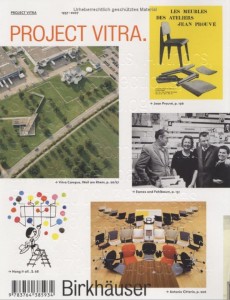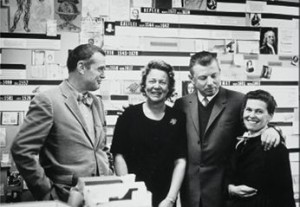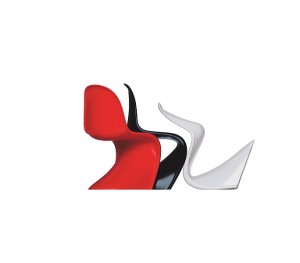
The snow is back in Leipzig and so whereas the weekend was spent enjoying the warm spring air - the evenings are now being spent enjoying the warm living room and a good book.
And so it's just as well we were recently at Leipzig book fair. Among the seemingly endless piles of new historical novels, travel guides - each, naturally, with the best insider tips - and Harry Potter wannabes there was also a few title that appealed to us.
"Project Vitra" from Rolf Fehlbaum und Cornel Windlin for Birkhauser is not only an interesting stroll through the history of Vitra - without question one of the world's most important and creative designer furniture houses - but is also a design classic in it's own right.
It was shortlisted in the graphics category for the Brit Insurance Design of the Year Award 2009, and won a bronze medal in the "Best Book Design from all over the World 2009" organised by the German foundation "Stiftung Buchkunst". The prizes were awarded at a ceremony in Leipzig during the book fair.

The "Project Vitra" story began in 1957 in Basel and Weil am Rhein and can more or less be summarised as: Willi and Erika Fehlbaum meet Charles and Ray Eames and start making furniture.
And they haven't really stopped.
In the intervening 50+ years Vitra have worked with designers as varied and individual as Jean Prouvé, Jasper Morrison, Antonio Citterio and Verner Panton. To name just five.
"Project Vitra" chronicles the decades and the creations and in doing so elucidates not only the Vitra story but also the philosophy which has guided Vitra since its establishment.
Writing in the Vitra Magazine in January, Rolf Fehlbaum - company Chef and son of grounders Willi and Erika - explained part of this philosophy; namely, the importance of the "individual authorship" of articles and the importance of the relationship between designer as "author" and Vitra:

A classic example of this process is the Panton Chair by Verner Panton which went through numerous design and prototype phases - all the result of the cooperation between Vitra and Panton - before the final, and widely copied, design was completed.
In "Project Vitra" the importance of this relationship and the eternal conflict between creative drive and commercial survival is wonderfully , and aesthetically, documented.
"Project Vitra" is not a book for cover-to-cover reading, and at 800 pages we wouldn't recommend it - it is however a wonderful reference book for all who enjoy quality designer furniture, want to learn more about how design classics are created or who simply enjoy good photography.
Or for those who are looking to escape the late march Leipzig snow with a glass of Tempranillo and an exquisitely laid-out and designed book.
smow don't stock "Project Vitra" but it can be ordered direct from the Birkhauser.